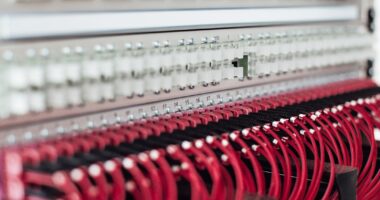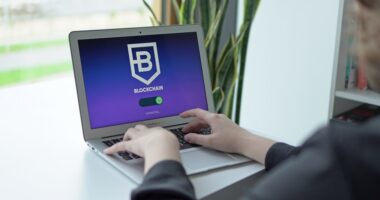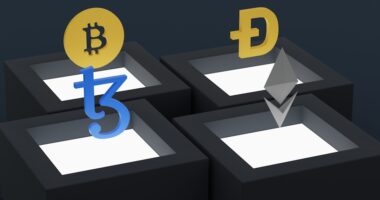Non-fungible tokens (NFTs) have taken the digital world by storm, revolutionizing the way we buy, sell, and trade digital assets. NFTs are unique digital tokens that represent ownership or proof of authenticity of a specific item or piece of content, such as artwork, music, videos, and even virtual real estate. What sets NFTs apart from other cryptocurrencies like Bitcoin and Ethereum is their non-fungible nature, meaning each token is unique and cannot be exchanged on a one-to-one basis like traditional currencies or cryptocurrencies.
NFTs are built on blockchain technology, which is a decentralized and distributed digital ledger that records transactions across a network of computers. This technology ensures the security and immutability of NFT transactions, making it nearly impossible to counterfeit or manipulate ownership records. Blockchain technology also enables smart contracts, which are self-executing contracts with the terms of the agreement directly written into code. This allows for automated royalty payments to creators whenever their NFTs are resold, providing a new revenue stream for artists and content creators. Overall, NFTs and blockchain technology have opened up a world of possibilities for creators and collectors, creating new markets and opportunities in the digital space.
Key Takeaways
- NFTs are digital assets that represent ownership of unique items using blockchain technology
- An NFT developer plays a crucial role in creating, deploying, and maintaining NFT smart contracts and platforms
- Required skills for an NFT developer include proficiency in blockchain technology, smart contract development, and understanding of NFT standards
- Responsibilities of an NFT developer include designing and implementing NFT smart contracts, integrating NFTs into platforms, and ensuring security and functionality
- Navigating the NFT ecosystem involves understanding marketplaces, platforms, and community trends to create successful NFT projects
- Future opportunities for NFT developers include expanding use cases and applications, while challenges include scalability and regulatory concerns
- To pursue a career as an NFT developer, individuals can start by learning blockchain development, gaining experience with NFT projects, and networking within the NFT community
The Role of an NFT Developer
An NFT developer plays a crucial role in the creation and maintenance of NFT platforms and marketplaces. They are responsible for designing, developing, and implementing the technical infrastructure that supports the creation, minting, buying, selling, and trading of NFTs. NFT developers work closely with blockchain developers, smart contract developers, and front-end developers to ensure a seamless user experience and secure transactions on NFT platforms.
NFT developers also play a key role in exploring and implementing new technologies and standards in the NFT space, such as interoperability between different NFT platforms, scalability solutions to handle increased transaction volume, and improving the environmental sustainability of NFTs by reducing their carbon footprint. As the NFT ecosystem continues to evolve, NFT developers will be at the forefront of innovation, driving the development of new features and functionalities that enhance the value and utility of NFTs for creators and collectors alike.
Required Skills and Qualifications
Becoming an NFT developer requires a strong foundation in blockchain technology, smart contracts, and web development. A bachelor’s degree in computer science, software engineering, or a related field is typically required, although some NFT developers may have gained their skills through self-study and practical experience. Proficiency in programming languages such as Solidity (for smart contracts), JavaScript, Python, and C++ is essential for building and maintaining NFT platforms.
In addition to technical skills, NFT developers should have a deep understanding of blockchain protocols such as Ethereum, which is currently the most popular platform for creating and trading NFTs. Knowledge of decentralized finance (DeFi) and other blockchain-based financial instruments is also beneficial, as it can help NFT developers integrate advanced financial features into NFT platforms. Strong problem-solving abilities, attention to detail, and the ability to work collaboratively in a team are also important qualities for NFT developers to possess.
Responsibilities of an NFT Developer
“`html
| Responsibilities |
|---|
| Developing smart contracts for NFTs |
| Integrating NFTs into blockchain platforms |
| Implementing NFT marketplaces and platforms |
| Ensuring security and compliance of NFTs |
| Collaborating with designers and artists for NFT creation |
| Testing and debugging NFT applications |
| Staying updated with NFT trends and technologies |
“`
The responsibilities of an NFT developer encompass a wide range of tasks related to the development and maintenance of NFT platforms. This includes designing and implementing the technical architecture of NFT platforms, integrating smart contracts for creating and managing NFTs, optimizing platform performance and security, and ensuring compliance with industry standards and best practices. NFT developers are also responsible for troubleshooting technical issues, implementing upgrades and new features, and staying up-to-date with the latest developments in blockchain technology.
In addition to technical responsibilities, NFT developers may also be involved in collaborating with other teams within an organization, such as marketing and business development, to drive user adoption and engagement on NFT platforms. They may also be responsible for conducting research and development to explore new opportunities for innovation in the NFT space, such as exploring new use cases for NFTs beyond art and collectibles.
Navigating the NFT Ecosystem
Navigating the NFT ecosystem can be a complex task due to the rapid pace of innovation and the diverse range of platforms and standards that exist within the space. As an NFT developer, it is important to stay informed about the latest trends and developments in the industry, including new blockchain protocols, emerging standards for NFTs, and evolving regulatory frameworks. Engaging with the broader blockchain community through forums, conferences, and online communities can provide valuable insights into the direction of the NFT ecosystem and potential opportunities for collaboration.
In addition to staying informed about industry developments, NFT developers should also be proactive in seeking out opportunities to contribute to open-source projects and standards bodies that are shaping the future of NFTs. By actively participating in these communities, NFT developers can help drive the development of new technologies and standards that benefit the entire ecosystem. Building strong relationships with other developers, creators, collectors, and industry stakeholders can also open up new opportunities for collaboration and innovation within the NFT space.
Future Opportunities and Challenges

The future of NFTs presents both exciting opportunities and significant challenges for developers. On one hand, the growing mainstream adoption of NFTs presents new opportunities for developers to create innovative platforms and applications that cater to a diverse range of industries beyond art and collectibles. This includes areas such as gaming, virtual real estate, digital identity, and more. The potential for integrating NFTs with other emerging technologies such as virtual reality (VR) and augmented reality (AR) also presents exciting possibilities for developers to explore.
However, the rapid growth of the NFT market also presents challenges related to scalability, interoperability, sustainability, and regulatory compliance. As more users flock to NFT platforms, developers will need to find scalable solutions that can handle increased transaction volume without compromising performance or security. Interoperability between different NFT platforms is also a key challenge that developers must address to ensure seamless transferability of assets across different ecosystems. Additionally, addressing concerns about the environmental impact of NFTs will require developers to explore more sustainable alternatives to current blockchain protocols.
How to Pursue a Career as an NFT Developer
Pursuing a career as an NFT developer requires a combination of education, practical experience, and ongoing learning. Aspiring NFT developers can start by obtaining a solid foundation in computer science or software engineering through formal education or self-study. Building proficiency in programming languages such as Solidity, JavaScript, Python, and C++ is essential for developing technical skills relevant to NFT development.
Practical experience can be gained through internships, freelance projects, or contributing to open-source initiatives within the blockchain community. By actively participating in real-world projects, aspiring NFT developers can gain valuable hands-on experience that will help them stand out in a competitive job market. Additionally, staying informed about industry trends through online resources, forums, and industry events can provide valuable insights into the evolving landscape of NFT development.
Networking with other professionals in the blockchain and NFT space can also open up opportunities for mentorship, collaboration, and potential job opportunities. Building a strong professional network can provide access to valuable resources and connections that can help aspiring NFT developers advance their careers. Finally, pursuing certifications or advanced degrees in blockchain technology or related fields can further enhance an aspiring NFT developer’s credentials and expertise in the field.
In conclusion, becoming an NFT developer requires a combination of technical skills, industry knowledge, practical experience, and ongoing learning. As the NFT ecosystem continues to evolve, there will be increasing demand for skilled developers who can drive innovation and create value within this dynamic space. By staying informed about industry developments, actively participating in open-source initiatives, building a strong professional network, and continuously honing their skills, aspiring NFT developers can position themselves for success in this exciting and rapidly growing field.
Looking for a comprehensive guide to NFT developer job descriptions? Check out this insightful article on NFT-Jobs.com that provides valuable insights into the skills and qualifications required for a career in NFT development. Whether you’re a seasoned developer or just starting out, this article offers essential information to help you navigate the rapidly growing NFT industry. Explore the latest trends and best practices in NFT development on NFT-Jobs.com to stay ahead in this dynamic field.
FAQs
What is an NFT developer job description?
An NFT developer is responsible for creating and implementing the technical aspects of non-fungible token (NFT) projects. This includes developing smart contracts, integrating blockchain technology, and building user interfaces for NFT platforms.
What are the key responsibilities of an NFT developer?
Key responsibilities of an NFT developer may include designing and implementing smart contracts, integrating NFT functionality into existing platforms, collaborating with designers and other developers, and ensuring the security and scalability of NFT projects.
What skills are required for an NFT developer?
Skills required for an NFT developer may include proficiency in blockchain technology, experience with smart contract development (e.g., Solidity), knowledge of NFT standards (e.g., ERC-721, ERC-1155), familiarity with web3 technologies, and a strong understanding of decentralized finance (DeFi) concepts.
What qualifications are typically needed for an NFT developer role?
Qualifications for an NFT developer role may include a degree in computer science, software engineering, or a related field, experience with blockchain development, proficiency in programming languages such as Solidity, and a strong portfolio of NFT-related projects.
What are the career prospects for NFT developers?
The demand for NFT developers is expected to grow as the NFT market continues to expand. NFT developers may find opportunities in various industries, including art, gaming, collectibles, and digital assets. Additionally, NFT developers may have the opportunity to work on innovative projects at the intersection of blockchain technology and creative industries.





